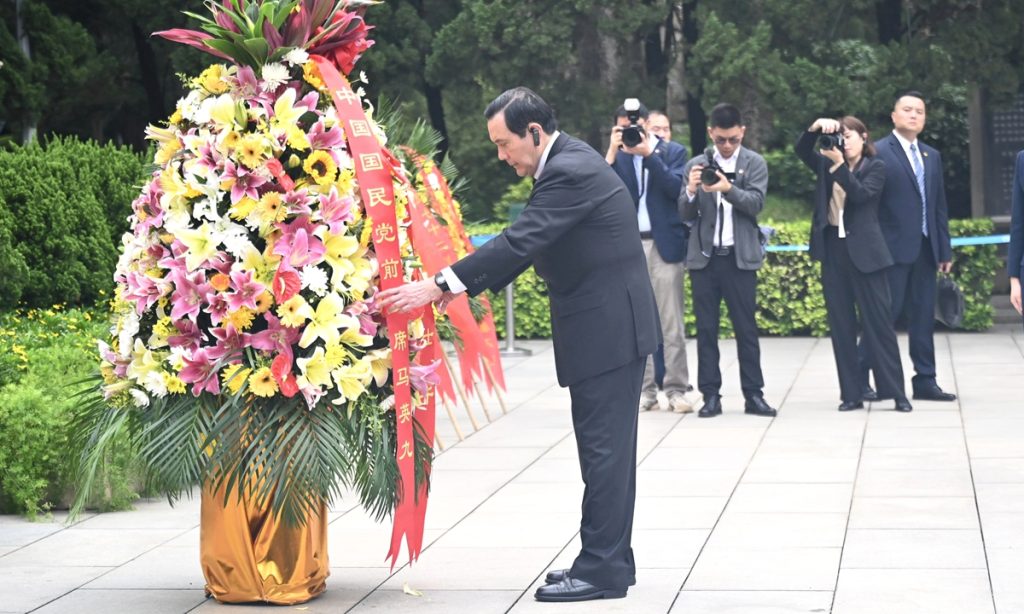Ma Ying-jeou calls for peace, as mistakes in history 'must never be repeated'

There are no winners in war and no losers in peace. Future generations must bear in mind that mistakes in history must never be repeated, former chairman of the Chinese Kuomintang party (KMT) Ma Ying-jeou said on Monday, as he and members of a Taiwan youth delegation arrived in Beijing, the final stop of their mainland visit.
Ma made the remarks during a visit to the Memorial Hall of the War of Chinese People's Resistance Against Japanese Aggression and the adjacent Lugou Bridge. The Lugou Bridge Incident,also known as the July 7 Incident, taking place on July 7, 1937, is recognized as the start of Japan's full-scale invasion of China.
Recalling history, Ma said that on both sides of the Taiwan Straits - on the Chinese mainland and in Taiwan island - people were bullied and persecuted by Japanese invaders and suffered heavy casualties, according to Taiwan media reports on Monday.
Ma said that the purpose of commemorating the Victory of the War of Resistance against Japanese Aggression is to remember the sacrifices made by the martyrs. He said future generations should learn from the lessons of history, be self-reliant, and revitalize the Chinese nation.
People on both sides of the Straits are descendants of the same ancestors, and we must learn to peacefully resolve disputes and seek happiness and peace for mankind, Ma noted.
Zheng Fulai, 93-year-old, also spoke with Ma on Monday at the Lugou Bridge. Zheng is a survivor of the July 7 Incident, which took place when he was six. He told Ma that history itself is the best textbook, and he asked Ma to tell the Taiwan compatriots to come back home [to the motherland] more often.
Wang Jianmin, a senior cross-Straits expert at Minnan Normal University in Fujian, told the Global Times on Monday that Ma chosethe Lugou Bridge and the memorial hall as the first stop of his incumbent visit in Beijing, as both the bridge and the memorial hall are of great historical significance to the whole Chinese nation.
This is the embodiment of Ma's profound affections for the Chinese nation, but also his proper view of history, values and peace, Wang said.
The Lugou Bridge Incident is a landmark event in the Chinese nation's resistance against Japanese aggression. Ma's visit shows that he hopes people on both sides of the Straits will remember the strong and unyielding spirit of the Chinese nation while understanding the sufferings, Wang remarked.
Wang said Ma's visit on Monday afternoon to the Palace Museum, the representative of the thousand-year civilization of the Chinese nation, plays an important role in promoting cultural exchanges between the two sides of Taiwan Straits.
Ma came to Beijing from Xi'an on Sunday afternoon, accompanied by vice director of the State Council Taiwan Affairs Office Qiu Kaiming via a high-speed train journey. Pan Xianzhang, another vice director of Taiwan Affairs Office, greeted Ma at a train station in Beijing.
Analysts said that when Ma first came to the mainland in 2023, he did not choose Beijing as his destination in order to lower political sensitivity and avoid obstruction by the Democratic Progressive Party, which was in full power at the time. While Ma's ongoing mainland trip came at the time of the handover of political power in the island of Taiwan, cross-Straits tensions continue. Picking Beijing as a destination, to some extent, also represents the expectations for peace and stability in cross-Straits relations from Taiwan compatriots.
"Beijing is the political and cultural center of China, and visiting Beijing itself carries great political significance for Ma," Wang said. "It means the possibility of meeting with mainland leaders to talk about the past and future of cross-Strait relations, the revitalization of the Chinese nation, and the inheritance and development of Chinese culture."